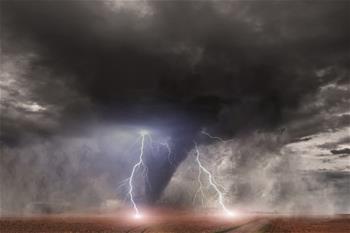Tornadoes can happen almost anywhere in North America and strike with little to no warning.

Most known for its hurricanes, Florida actually has more tornadoes per 10,000 square miles than any other state, including those in “Tornado Alley”. Although Florida tornadoes rarely reach top-end strength, they can still be destructive. The state’s deadliest tornado event to-date occurred in 1998, killing 42 people after overnight tornadoes touched down in several counties.
Florida tornadoes can occur in all seasons, though they are more common in Spring and Summer months, and have the ability to develop during the afternoon or at night. This dangerous characteristic means that people could be sleeping and not receive weather warnings. Tornadoes can uproot trees, move cars, down power lines, injure those in its path, and damage homes.
It is important to be prepared before severe weather nears you and your family.
What should I keep in my emergency supply kit? Have enough food, water, toiletries, and supplies to last for at least 72 hours. Include medicine, glasses, first aid items, flashlights, batteries, and mobile device chargers in your kit.
In preparedness for any type of storm, keep an emergency supply kit on standby and a battery-operated weather radio with tone alert in your home. A weather radio will allow you to receive weather warnings issued by the National Weather Service.
What is the difference between a tornado watch and a tornado warning?
A tornado watch means that a tornado is possible due to favorable weather conditions.
- Listen to the radio or TV for updates.
- Move cars and lawn furniture inside.
A tornado warning means a tornado has actually been spotted and you should seek shelter immediately.
- If you live in a home or condo the safest place to be is the basement. If that is not an option, take cover in a centrally-located room with no windows on the lowest level of your home, such as a bathroom, closet, or hallway.
- If you live in a manufactured home plan ahead and seek cover elsewhere, either at a relative’s or community building for example, before weather conditions deteriorate. Manufactured homes are not built to sustain tornado conditions. If there is no time, you are safer outside than in your manufactured home.
Stay in your shelter until the tornado has passed or emergency personnel has arrived.
My home was damaged. What do I do now?
If you can safely do so, take reasonable steps to protect your property from further damage, such as boarding up a broken window or tarping the roof. Take pictures of the damage and save all receipts for any purchases you need to make. Refrain from making permanent repairs until an adjuster has had a chance to assess the damage.
Contact your insurance company as soon as possible to report your claim.
Avoid scams. Unfortunately, there are unscrupulous contractors out there. If you sign an Assignment of Benefits contract, you relinquish control of your claim to a contractor – a decision that could cost you money, or even your home.